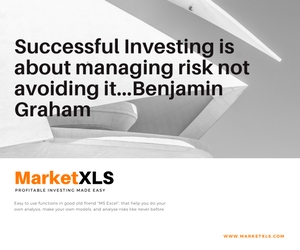Jussi Askola is the President of Leonberg Capital, a boutique investment research firm specializing in mispriced real estate securities often trading at high discounts to NAV and excessive yields. In addition to being a CFA Level III candidate, he holds a B.Sc. in Real Estate Finance from University Nürtingen-Geislingen (Germany) and a B.Sc. Construction and Property Management from University of South Wales (UK). Mr. Askola’s newsletter, the High Yield Landlord, has built up a solid subscriber base of investors who look for his monthly pointers on Real Estate Investment Trusts (REITS). Mr Askola is passionate about the potential of high yielding REIT stocks. Recently, he sat down with the Sick Economist to talk about investment opportunities within the healthcare sector.
Q: In a recent post on Seeking Alpha, you pointed out that specialty REIT investments may offer more value than either passive indexing, or general real estate holdings. What kinds of opportunities might you see around Healthcare REITS?
A: Healthcare REITs include many serial outperformers that have produced some of the highest total returns in not only the REIT market, but the entire stock market. A notorious example is Ventas ($VTR) which has managed to compound returns at 23% per year since 1999. Omega Healthcare ($OHI) is another example which has grown its share price by over 15% per year since 2002, and this does not even include the hefty dividend payments. One key reason for this significant outperformance is that cap rates (= initial property yields) remain relatively high across healthcare properties – allowing REIT investors to earn substantial spreads over the cost of capital. In addition to the high yield, the demand for healthcare properties is growing as a result of the rapidly aging population. It supports rent growth and high occupancy rates across the full market cycle. Therefore, Healthcare REITs have also been some of the strongest performers during recessions, including the great financial crisis. Right now, the most exciting opportunities are found in the Hospital and Private Pay senior housing segments in our opinion. Hospitals enjoy very strong operators with high rent coverage ratios and little risk of rising vacancy. Senior housing, on the other hand, is attractive in that it generally does not rely on the government to pay rent checks. We currently hold two investments in these segments at High Yield Landlord.

Q. What are some of the big red flags that investors should be wary of when selecting a REIT investment?
A: With Healthcare REITs in particular, investors should pay close to attention to the strength of their underlying operators (tenants). Several Healthcare REITs are today at high risk of rising vacancy rate due to speculative operators who are fighting to remain profitable. In case of a tenant bankruptcy, REITs lose cash flow and may even have to cut their dividend. In addition to strong operators, investors should favor REITs with conservative balance sheets as we enter the final years of an already extended bull market. Medical Property Trust ($MPW) would be a good example of a REIT that we find attractive right now. It owns a resilient portfolio of hospital properties that is operated by strong operators and it has a strong balance sheet. With a 5.5% dividend yield and ~5% annual growth; we believe that investors are set for ~10% total annual returns.
Q: There has been a lot of debate in the Financial Media about the true nature of inflation in our current economy. Many feel that the FED understates inflation rates. How might a REIT investment help protect a portfolio from inflation?
A: I agree that inflation risk is a widely underestimated in today’s market. REITs provide a natural protection against inflation because they own real estate – a vital and tangible asset to our society. With the printing presses going wild, real estate helps me to sleep well at night because it will always be valuable – regardless of how our underlying currencies perform. In fact, most leases are today directly tied to an inflation index and rents increases can be automatically enforced. Research from NAREIT demonstrates that the dividend growth of REITs has outpaced inflation in all but two of the last twenty years.

Q: What are some critical resources for a beginning REIT investor? How could a REIT investor educate himself/herself?
A: I recommend investors to get started by reading the book: “Investing in REITs” by Ralph Block. This will your most important resource in getting started. I also recommend investors to visit REIT section of the “Seeking Alpha” website. It is full of interesting research reports on various REIT investment opportunities.
Q: Please tell our readers about your newsletter, the High Yield Landlord. In particular, what kind of information is offered to your subscribers, and who would benefit the most from a subscription?
A: High Yield Landlord is one of the largest REIT investment newsletters in the world with over 500 members on board. We spend 1000’s of hours and well over $20,000 per year researching the market for the most profitable investment opportunities and share the results with our members at a tiny fraction of the cost. Our objective is to maximize performance by investing in undervalued REIT opportunities with superior dividend yields. So far, the results are paying off and we are outperforming the market by a large margin while enjoying an ~8% average dividend yield. If you are interested to learn more about our newsletter, please click here.
PS: We are offering a 2-week free trial and a $100 sale for the next 3 members only. Thanks, Mr. Askola!!!
https://www.leonbergcapital.com/








Hello! I could have sworn I’ve been to your blog before but after going through
some of the posts I realized it’s new to me. Nonetheless,
I’m definitely delighted I came across it and I’ll be book-marking it and
checking back regularly!